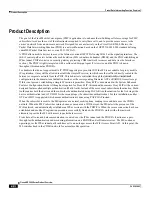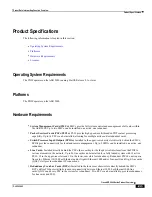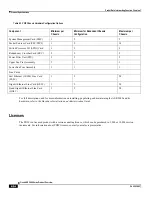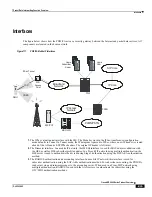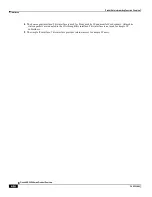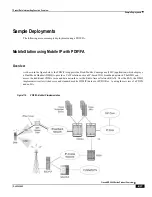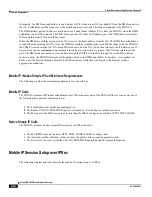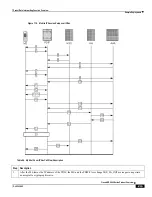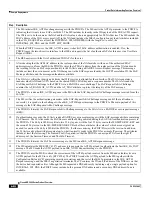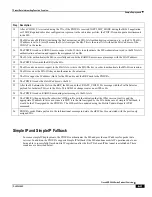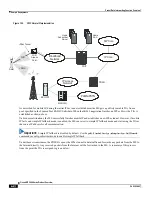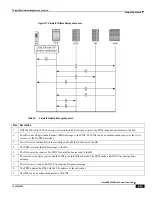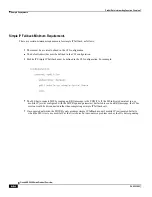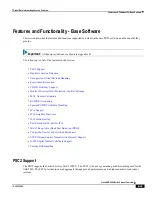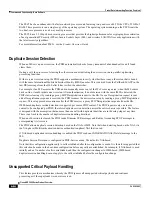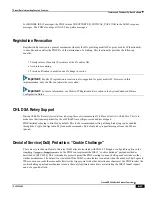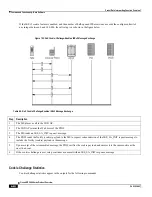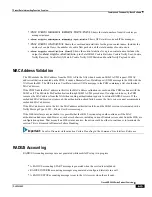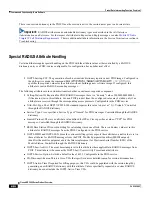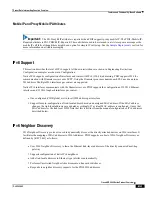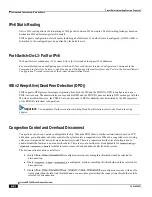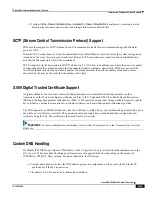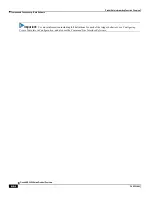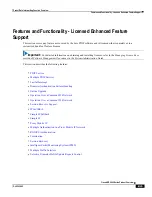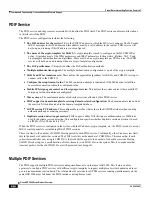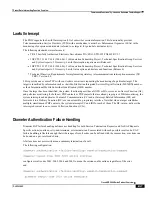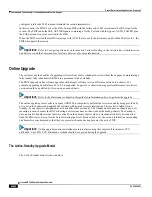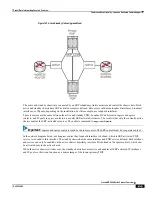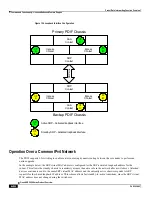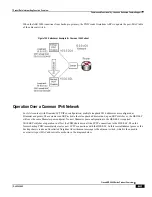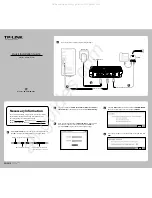
Packet Data Interworking Function Overview
▀ Features and Functionality - Base Software
▄ Cisco ASR 5000 Series Product Overview
OL-22938-02
The PSC2 has been enhanced with a faster network processor unit, featuring two quad-core x86 2.5Ghz CPUs, 32 GB of
RAM. These processors run a single copy of the operating system. The operating system running on the PSC2 treats the
two dual-core processors as a 4-way multi-processor.
The PSC2 has a 2.5 G/bps-based security processor that provides the highest performance for cryptographic acceleration
of next-generation IP Security (IPSec), Secure Sockets Layer (SSL), and wireless LAN/WAN security applications with
the latest security algorithms.
For more information about PSC2s, see the
Product Overview Guide.
Duplicate Session Detection
When an MS sets up a new session, the PDIF automatically checks for any remnants of abandoned calls and if found,
clears them.
During a call, the processes of clearing the old session and establishing the new session run in parallel, optimizing
processing functions.
With every new session setup, the PDIF supports a mechanism to verify whether there is any old session that is bound
with the same International Mobile Subscriber Identity (IMSI) number. This is derived from the Callback-Id AVP in the
last DEA message from the HSS after it has verified the subscriber.
For example, if an MS accesses the PDIF and subsequently moves out of the Wi-Fi coverage area, when the MS comes
back on line, it could initiate a new session. After authentication, if an old session with the same IMSI is detected, the
PDIF starts clearing it by sending a proxy-MIP Deregistration request to the HA. Once a Deregistration request is sent
and a Deregistration response is received, the PDIF resumes the new session setup by sending a proxy-MIP Registration
request. This setup procedure continues after the PDIF receives a proxy-MIP Deregistration response from the HA.
IMSI-based duplicate session detection is supported per source PDIF context. The PDIF requires only one source
context to be configured per PDIF, therefore duplicate session detection across the entire chassis is possible. The feature
is designed with the assumption that no more than one call with duplicate identifies are in the setup stage at any time.
There is no limit to the number of duplicate session handling iterations.
When an old session is cleared, the PDIF sends Diameter STR messages and Radius Accounting STOP messages to
corresponding AAA servers.
The PDIF allows duplicate session detection based on the NAI or IMSI. Note that when detecting based on the NAI, it is
the first-phase (Multi-Authentication device authentication phase) NAI that is used.
If NAI-based duplication session handling is enabled, the PDIF sends an INFORMATIONAL (Delete) message to the
MS.
Duplicate Session Detection is configured in PDIF-Service mode. The default is NAI-based.
Note that this configuration applies only to calls established after the configuration is made. It is therefore suggested that
this selection be made in the boot-time configuration before any calls are established. For example, if NAI-based is used
initially and an X number of calls is established, and then the configuration changes to IMSI-based, IMSI-based
duplicate session handling does not apply to the calls established before the configuration change.
Unsupported Critical Payload Handling
This feature provides a mechanism whereby the PDIF ignores all unsupported critical payloads and continues
processing as if those payloads were never received.
Summary of Contents for ASR 5000 Series
Page 1: ......
Page 26: ......
Page 48: ...New In Release 10 0 SCM Features Cisco ASR 5000 Series Product Overview OL 22938 02 ...
Page 50: ......
Page 58: ......
Page 68: ......
Page 126: ......
Page 138: ......
Page 146: ......
Page 218: ......
Page 236: ......
Page 356: ......
Page 374: ......
Page 422: ......
Page 496: ......
Page 572: ......
Page 654: ......
Page 700: ......
Page 726: ......
Page 784: ......
Page 816: ......
Page 844: ......
Page 906: ......
Page 926: ......
Page 942: ......
Page 943: ...Cisco ASR 5000 Series Product Overview OL 22938 02 Chapter 30 Technical Specifications ...
Page 966: ......
Page 972: ......

